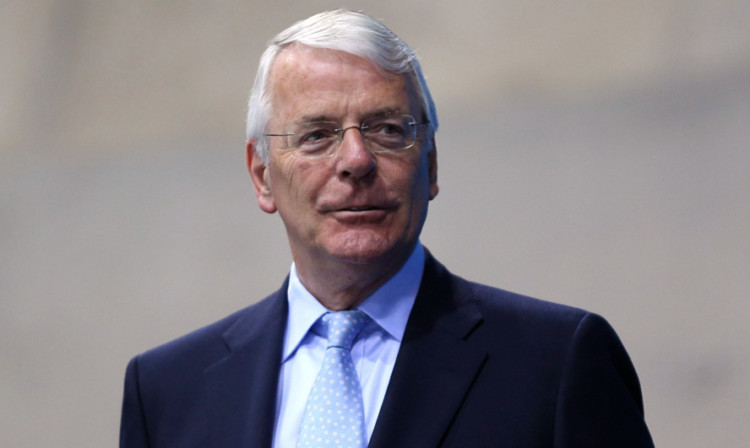An independent Scotland will not keep the pound and its memberships of the European Union (EU) and Nato are doubtful, according to former prime minister Sir John Major.
The future of the Faslane naval base on the Clyde is also doubtful if Scotland rejects nuclear weapons, the former Conservative MP who also served as Chancellor and Foreign Secretary said.
Nationalists deliberately use anti-English sentiment to irritate and enrage, he said.
The referendum to make Scots “foreigners” will be held on the anniversary of Bannockburn, but also the First World War when British soldiers “fought together for freedom”, he told business leaders.
But the Scottish Government say the pound is just one of the assets that Scotland will be entitled to a share of after independence and described Sir John as a discredited figure who presided over the Tories’ “complete wipe-out in Scotland”.
In a speech to the Institute of Directors in London last night, Sir John said: “Independence means Scotland walking away from the UK and its institutions. This must include the Bank of England and Sterling.
“A currency union, which the SNP assume is negotiable, would require the UK to underwrite Scottish debts. That cannot – will not – happen if Scotland leaves the union.”
Many EU states would “have concerns about the accession of a separatist member”, he said.
“Spain uses uncertainty over EU membership to deter Catalonia from even holding a referendum on independence. It is hardly likely she would happily wave in Scotland. Spain will not be alone in being wary of separatist tendencies.”
Sir John, whose premiership was scarred by long-running battles with Tory Euro-sceptics, backed David Cameron’s plan for a UK in/out referendum on the EU, but warned Britain will pay a “severe price” if it votes yes.
Britain will also suffer if Scotland leaves, heralding a costly relocation of Trident and diminished influence in Europe, Nato and around the world, he said.
He said: “Would Faslane survive? One can only guess. But without contracts from the Royal Navy I doubt it.
“It is also doubtful the SNP would be able to enter Nato, as they wish, since their opposition to nuclear weapons is inconsistent with membership.”
The SNP’s oil revenue projections are “twelve times greater” than official UK figures, he said.
“Anti-English sentiment from separatists irritates and enrages, as it is intended to do, but across the UK people know and value Scots as partners, work colleagues, friends and neighbours. It is hard to imagine Scots becoming foreigners.
“The SNP have chosen the ancient anniversary of Bannockburn for their referendum. Yet a greater anniversary looms. Next year sees the centenary of the beginning of the Great War, in which the English, Scots, Welsh, and Irish, the whole of the United Kingdom, fought together for freedom as they would again 25 years later. Would it not be a tragedy if, as we honour their sacrifice, we do so as separate nations?
A spokesman for First Minister Alex Salmond said: “Sir John Major is quite wrong to suggest that the rest of the UK should lay exclusive claim to all the assets of the UK, which the people of Scotland contribute to and of which Sterling is one.
“But he is also just about the very last person the No campaign should be calling on to make their case.
“He was the Tory prime minister who presided over his party’s complete wipe-out in Scotland and the more he tries to lecture the people of Scotland, the better it will be for the Yes vote.”
